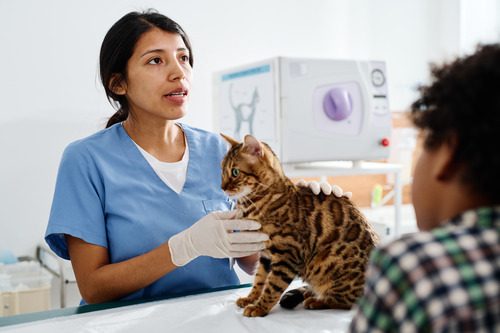Diagnosing Cat Neurological Disorder and Treatment Options

Neurological disorders in cats encompass a range of medical conditions that affect the brain, spinal cord, and nerves. These disorders can be particularly challenging to diagnose due to the complex nature of the nervous system and the subtle signs that cats may exhibit. Understanding the common symptoms and diagnostic approaches can help cat owners identify potential problems early. Treatment options vary depending on the specific condition but generally aim to manage symptoms and improve quality of life. This blog explores the signs of neurological disorders in cats, how these conditions are diagnosed, and the available treatment options.
Subtle Symptoms of Neurological Issues in Cats
Cats are adept at hiding discomfort and illness, making it crucial for pet owners to be vigilant about subtle changes in behavior or movement. Symptoms of a cat neurological disorder might include:
- Uncoordinated movements
- Seizures
- Unusual eye movements
- Changes in behavior
- Weakness
These signs can indicate a range of issues, from mild infections to severe neurological damage.
When to Seek Veterinary Care
If you notice any of the above symptoms in your cat, it’s important to contact a veterinarian immediately. Early diagnosis and treatment are key to managing neurological disorders effectively. Don’t wait for the symptoms to become more severe before seeking professional advice.
Diagnostic Approaches for Cat Neurological Disorders
Initial Examination and History
The first step in diagnosing a neurological disorder in cats is a thorough physical examination by a veterinarian. The vet will assess the cat’s gait, reflexes, pain response, and overall physical condition. A detailed history from the owner about the onset of symptoms, their duration, and any possible injuries or incidents that might have precipitated the condition is also crucial.
Advanced Diagnostic Tools
Further diagnostics may include imaging techniques like MRI or CT scans to view the brain and spinal cord. These tools are invaluable for identifying tumors, inflammations, or injuries that could be affecting the cat’s neurological health. Blood tests and cerebrospinal fluid analysis may also be conducted to check for infections or diseases that could be impacting the nervous system.
Treatment Options for Cat Neurological Disorders
Treatment depends on the specific diagnosis but often includes medications to control seizures, reduce inflammation, and manage pain. Anticonvulsants may be used for seizure management, while corticosteroids can help reduce inflammation. It’s important to follow the veterinarian’s guidance closely and attend all follow-up appointments to monitor the cat’s response to treatment.
Supportive Care and Rehabilitation
Alongside medication, supportive care is vital. This may include modifications to the home environment to ensure it’s safe and accessible for a cat with mobility issues. Physical therapy and rehabilitation can also play a crucial role in helping maintain muscle strength and coordination.
The Importance of Ongoing Monitoring
Neurological disorders in cats typically require ongoing management and routine check-ups. Regular veterinary visits are essential to adjust treatments as needed and to monitor the overall health of the cat. The goal is to maintain the best possible quality of life for your pet.
Understanding the Prognosis
The prognosis for cats with neurological disorders varies widely based on the underlying cause and the severity of the condition. While some disorders can be managed effectively with treatment, others may progress over time. It’s important to have realistic expectations and to discuss the long-term outlook with your vet.
Ensuring Your Cat’s Health and Comfort
Neurological disorders in cats are complex and can be distressing for both the cat and the owner. Recognizing the signs early and seeking veterinary care promptly can significantly influence the effectiveness of treatment and the overall prognosis. If you suspect your cat might be showing signs of a neurological disorder, call Yalesville Veterinary Hospital at (203) 265-1646 for an appointment. Our dedicated team is here to provide expert care and support every step of the way.
